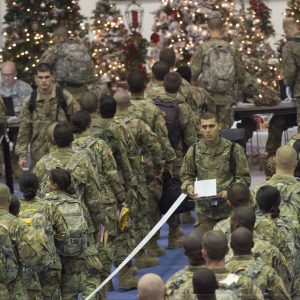Does Holiday Exodus impact soldier training?
Another year has come and gone, sending us all back to schools, jobs, and obligations we’ve put off to be with family—or maybe binge watch our favorite TV show. Do you remember what you were doing that final day in the office of 2017? I know I don’t—except for maybe willing the time to rush by so I could hit the road with a trunk full of Christmas presents.
And since the Army is made up of people, when soldiers in the training environment leave for holiday exodus—the regulation-required, 10-day break encompassing Christmas and New Years Day—they suffer in the same thing we do. They lose ground. An article at Army.mil states that when soldiers come back after two weeks off from training, they only retain about 70 percent of what they’ve previously learned.
This means their NCOs and officers have to review and recover quite a bit of lost knowledge—not to mention reinforcing Army discipline—while also barreling through to finish teaching all the requirements. Could these soldiers who undergo training during exodus be put at a disadvantage later? Are they getting the same experience as soldiers who complete courses during any other time of the year when no breaks are allowed?
These are important questions the Army should address moving forward to ensure that trainees are getting the fullest, richest education of their military occupational specialty possible. This improves their own personal skills and overall improves the readiness of the unit they ultimately land in.
Then there is the PR factor. Many people believe the benefits of seeing soldiers in uniform reuniting with family during the busy holiday travel season is enough to counter-balance the negatives.
Maj. Gen. Pete Johnson, commander, U.S. Army Training Center and Fort Jackson, South Carolina, is quoted in the Army website’s article touting the benefits of soldier’s returning home to tell the Army story. He also joked that the logistical challenges of coordinating that many holiday vacations is like planning for the D-Day landings.
Of course, not granting holiday exodus means that cadre, too, have to remain on post and continue to train soldiers. And let’s face it, we do all want to take a break and enjoy downtime at the holiday season—whether traveling cross-country of staying home alone. So perhaps, if it’s found that holiday exodus does negatively impact soldiers’ education, the Army should consider scheduling courses to that none overlap with the final two weeks of the year.
Not only would cadre continue to get their own coveted family time, it could also cushion in time to allow for adjustments, critiques and corrections of course materials, techniques, and distributions of workload. Think of it like teacher in-service days. It’s a day to catch up on paperwork, assess how things are going and be prepared when students return.
While no one wants to be the Grinch who takes holiday exodus from soldiers, it’s important that all options are assessed to ensure the fighting force is as strong and focused as possible.
CUTLINE: Trainees stand in line for processing at the Solomon Center on Fort Jackson, S.C., Dec. 18, 2017, as they prepare to depart on for Holiday Block Leave.
Photo Credit: U.S. Army photo by Robert Timmons


You must be logged in to post a comment.